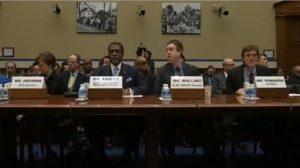As the Flint water crisis continues, Congress is holding two hearings this week on the city’s public health disaster, which resulted when the state emergency manager, appointed by Michigan Gov. Rick Snyder, changed the city’s water supply. Federal lawmakers are reportedly trying to determine who is to blame and what should be done moving forward to help the residents of this beleaguered city.
The U.S. House Committee on Oversight and Reform scheduled two hearings — one today featuring former Flint mayor Dayne Walling, former Flint emergency manager Darnell Earley, former U.S. Environmental Protection Agency Region 5 director Susan Hedman, and Virginia Tech university professor Marc Edwards.
Gov. Snyder and EPA Administrator Gina McCarthy are scheduled to testify on Thursday, March 17. In February, Snyder — who has come under fire for the role of his administration in the lead poisoning debacle, with calls for his resignation if not his arrest — initially declined an invitation to testify before another Congressional committee, as CNN reported.
Last month, Snyder said he couldn’t testify before the House Democratic Steering and Policy Committee — which held a hearing on children affected by lead in the water — because he had to deliver a budget presentation to the Michigan legislature. In a letter to the governor, the committee wrote that Congress “has not heard testimony from you on the Flint water crisis.”
“Unfortunately, a prior Congressional hearing this week did not include top state officials, including emergency financial managers appointed by you to run the city of Flint,” the letter added. “Seeing how it was your administration’s decisions that led to this public health crisis, including Michigan’s Emergency Manager Law, we believe it is important to hear testimony from you on this matter.”
As Mlive.com reported, the witnesses at a Feb. 3 inquiry held by this committee included Flint resident LeeAnne Walters, Marc Edwards, Keith Creagh, director of the Michigan Department of Environmental Quality and EPA representatives.
As there is evidence pointing to a breakdown on the state and federal levels leading to a poisoning of Flint residents, testimony on the first day reflected a blame game and deflection of responsibility, amid Congressional grandstanding.
In his prepared testimony, Earley argued that as an overwhelmed emergency manager, he and other Flint officials “were all totally dependent” on experts from the Michigan Department of Environmental Quality and the EPA for advice.
He also said, “It would have been unreasonable … to reject their guidance and attempt to make independent rulings on a highly sophisticated and scientific subject matter,” but added that in hindsight he should have done more to push back at those experts who claimed the issues were harmless.
“In relying on experts, the solutions I oversaw failed to ameliorate the troubles plaguing Flint’s water,” Earley added.
In his testimony, former Mayor Walling blamed the state for the crisis.
“These same decisions would not have been made by City Council,” Walling said. “When the manager’s decisions became known, I expressed my concerns internally about the switch, including the community’s perception of the river as polluted, the short timeline to accomplish such a critical change … and the limited staff capacity and inexperience that Department of Public Works’ leadership had with running a full-time water treatment plant.”
Susan Hedman, the former EPA Midwest chief, told the legislators that she urged state officials to act more quickly on the anti-corrosion treatment of the water, but state authorities were slow in responding, as the Detroit News reported.
Hedman said she resigned on Feb. 1 due to the crisis and “false allegations about me” published in January “which EPA was unable to correct on the record before they began to damage the agency’s ability to perform critical work in Flint.”
She said what happened in Flint should not have happened anywhere in the country, and she was “horrified” that it happened in her region, adding that resigning from her post “was the honorable thing to do.”
“The bad news is that this problem should never have happened in the first place, and I need to remind you: EPA had nothing at all to do with that,” Hedman added.
According to Edwards, the EPA was “completely unrepentant and unable to learn from their mistakes,” also offering that “I don’t know the law, but as a human being, she should have told people immediately.”
Rep Connolly makes the point that local (i.e., state/Snyder) government is the first line of defense and they failed epically. #FlintHearing
— Chris Savage (@Eclectablog) March 15, 2016
In #Flint hearing, Chaffetz reveals internal EPA memo that says, “I’m not so sure Flint is the community we want to go out on a limb for.”
— Abby Goodnough (@abbygoodnough) March 15, 2016
#FlintHearing Frmr Flint Mayor Walling: “Unfortunately Snyder discounted local input.. Council didn’t make switch decision”#FlintWaterCrisis
— Hector Solon (@HectorSolon) March 15, 2016
Sure sounds like this GOP hearing is gearing up to throw the EPA under the bus regarding Flint
— Claps on the 1s & 3s (@VeryWhiteGuy) March 15, 2016
Marc Edwards pointing out that EPA is allowing cities to flout testing on using lead pipe samples since 2006. https://t.co/IfpLQxivs8
— edsdet (@edsdet) March 15, 2016
#FlintHearing: Rep Horton to EM Earley: “The ‘experts’ seem to have been citizens in Flint” – Earley trying to blame DEQ. #FlintWaterCrisis
— Hector Solon (@HectorSolon) March 15, 2016
Justin Amash is calling utter BS on Darnell Earley’s deflection of blame at the #FlintHearing since he was in charge #FlintWaterCrisis
— Chris Savage (@Eclectablog) March 15, 2016
#FlintHearing Frmr Flint Mayor Walling: “Unfortunately Snyder discounted local input.. Council didn’t make switch decision”#FlintWaterCrisis
— Hector Solon (@HectorSolon) March 15, 2016
Rep. Jason Chaffetz, the Republican chairman of the House committee, has used this episode to place the blame on the EPA, a federal agency that is often a target of elimination by GOP lawmakers.
“There has been a catastrophic failure from top to bottom, and someone has to be held responsible,” Chaffetz told The Guardian. “We aren’t going to say, ‘Oops, let’s just move on.’ ”
“It’s shocking that the EPA knew about Flint and yet never let anyone know about it. What good are they if they knew about it and didn’t do anything? This is an organization that wants to control every puddle in the country but they can’t handle it. This isn’t solved with more money or authority, because they’ve been flat-out incompetent” the lawmaker offered. “It’s impossible to think the federal government can monitor every situation with 300 million people and who knows how many water systems. We have national standards, but states should be warned to not rely upon the EPA. Conceptually, we need less EPA, not more. They’ve failed at every chance they’d had.”
Meanwhile, with Gov. Snyder scheduled to testify in the second round of hearings later in the week, this is only just beginning.



